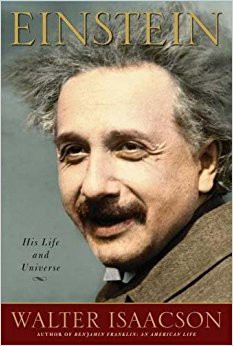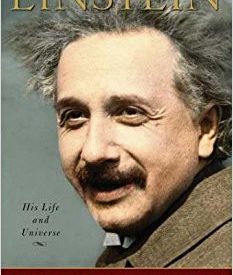
I have been curious for some time to learn about Einstein the person ? What were his beliefs? How did he approach science? How did he think? So I read Walter Isaacson?s biography Einstein: His Life and Universe. The two most important features of Einstein?s personality that I took away were his curiosity and nonconformist thinking.
Curiosity
Einstein was intensely curious, and this part of his personality emerged very early in childhood. There is a story from when he was 4 or 5 that involved a magnetic compass.
?He [Einstein] was sick in bed one day, and his father brought him a compass. He later recalled being so excited as he examined its mysterious powers that he trembled and grew cold. The fact that the magnetic needle behaved as if influenced by some hidden force field, rather than through the more familiar mechanical method involving touch or contact, produced a sense of wonder that motivated him throughout his life. ?I can still remember ? or at least I believe I can remember ? that this experience made a deep and lasting impression on me,? he wrote on one of the many occasions he recounted the incident.
?After being mesmerized by the compass needle?s fealty to an unseen field, Einstein would develop a lifelong devotion to field theories as a way to describe nature.?
Einstein was attracted to the great mysteries of science, life, and the universe. Later in life, Einstein wrote to a friend:
?People like you and me never grow old. We never cease to stand like curious children before the great mystery into which we were born.?
He was convinced that the universe was full of mysteries that needed be solved. And that was what sparked the intense curiosity within him. Einstein once wrote:
?Out yonder there was this huge world, which exists independently of us human beings and which stands before us like a great, eternal riddle.?
As a result, Einstein would notice and explore things that others would miss. He would engage in deep ?thought experiments? to unravel these mysteries. As Isaacson wrote:
?What would it be like to race alongside a light beam? If we are moving through a curved space the way a beetle moves across a curved leaf, how would we notice it? What does it mean to say that two events are simultaneous? Curiosity, in Einstein?s case, came not just from a desire to question the mysterious. More important, it came from a childlike sense of marvel that propelled him to question the familiar, those concepts that, as he once said, ?the ordinary adult never bothers about.??
Einstein himself put it best when he said:
?I have no special talents, I am only passionately curious?
Nonconformist, independent thinking
In addition to curiosity, Einstein?s willingness to be a nonconformist was an important part of his personality. His ability to question the conventional wisdom provided the creative spark that ultimately led to many of his scientific breakthroughs. As Isaacson wrote:
?Skepticism and a resistance to received wisdom became a hallmark of his life. As he [Einstein] proclaimed in a letter to a fatherly friend in 1901, ?A foolish faith in authority is the worst enemy of truth.??
Einstein never felt encumbered by prevailing views or conventional thinking. As Banesh Hoffman, a collaborator of Einstein?s in his later years, wrote:
?His early suspicion of authority, which never wholly left him, was to prove of decisive importance? Without it he would not have been able to develop the powerful independence of mind that gave him the courage to challenge established scientific beliefs and thereby revolutionize physics.?
This nonconformist, independent thinking ultimately led to his discovery of the Special Theory of Relativity in 1905. Other scientists ? most notably Lorentz and Poincare ? were close in their explorations and could also have discovered the theory. But they lacked the nonconformist thinking.
?It?s worth asking why Einstein discovered a new theory and his contemporaries did not. Both Lorentz and Poincare had already come up with many of the components of Einstein?s theory. Poincare even questioned the absolute nature of time.
?But neither Lorentz nor Poincare made the full leap: that there is no need to posit an ether, that there is no absolute rest, that time is relative based on an observer?s motion, and so is space. Both men, the physicist Kip Thorne says, ?were groping toward the same revision of our notions of space and time as Einstein, but they were groping through a fog of misperceptions foisted on them by Newtonian physics.?
?Einstein, by contrast, was able to cast off Newtonian misconceptions. ?His conviction that the universe loves simplification and beauty, and his willingness to be guided by this conviction, even if it meant destroying the foundations of Newtonian physics, led him, with a clarity of thought that others could not match, to his new description of space and time.??
Or, as physicist Freeman Dyson wrote:
?The essential difference between Poincare and Einstein was that Poincare was by temperament conservative and Einstein was by temperament revolutionary.?
Einstein put it the best himself in a foreward that he wrote near the end of his life to a new edition of Galileo:
?The theme that I recognize in Galileo?s work is the passionate fight against any kind of dogma based on authority.?
This passion for nonconformist, independent thinking shaped his personal and political beliefs in addition to his approach to science. He opposed militarism and nationalism, and any political movements that curtailed freedom of expression or freedom of thought. During the 1920s and 1930s, he was opposed to the Nazi movement for this reason. Later, when he had immigrated to the United States, he was opposed to 1950s McCarthyism and the accompanying push for conformist thinking for the same reason.
As Isaacson wrote:
?There was a simple set of formulas that defined Einstein?s outlook. Creativity required being willing not to conform. That required nurturing free minds and free spirits, which in turn required ?a spirit of tolerance.? And the underpinning of tolerance was humility ? the belief that no one had the right to impose ideas and beliefs on others.?
Putting them together
Einstein?s curiosity and his nonconformist personality worked together to produce innovative breakthroughs.
- Einstein?s curiosity and childlike wonder led him to explore problems and concepts that most other people didn?t notice or care about.
- As he began to explore these concepts, his nonconformist thinking enabled him to question fundamental and widely held assumptions, which ultimately led to the dramatic insights.
I was pleasantly surprised to see that Einstein?s way of thinking was very similar to Nobel prize winning physicist Richard Feynman. The two characteristics of curiosity and nonconformist thinking are also what led Feynman to his innovative breakthroughs.
Feynman?s curiosity was evident at a young age from his intense concentration on solving puzzles (?Once I get on a puzzle, I can?t get off,? he wrote). As a grad student and even as a professor, Feynman remained intensely curious ? he once created an ?ant ferry? to study the behavior of ants that had crawled into his home near Caltech.
Feynman was also an independent thinker, and used first principles thinking to question ?experts? and fundamental assumptions. He told the story of how he determined the law of beta decay by going beyond the so-called experts and solving the problem entirely on his own, from scratch, without relying on prior work.
So what can we learn from all of this? We cannot all be as talented as Einstein. But we can learn from his example, and cultivate the qualities of curiosity and nonconformist thinking in ourselves. If we can get to even a fraction of the point where Einstein was in terms of curiosity and independent thinking, we will be much better prepared to discover fundamental, innovative insights.
And let?s definitely encourage these qualities in our children. Society drums into children that curiosity can be a waste of time, and that it?s better to conform to existing laws, rules, and beliefs. The lesson from Einstein is that we must help our children retain their curiosity, and encourage them to become independent, critical thinkers.


